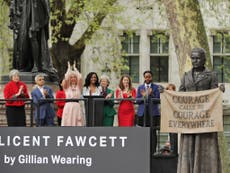The Independent's journalism is supported by our readers. When you purchase through links on our site, we may earn commission.
The statue of Millicent Fawcett was unveiled today. But should we have been brave enough to make it Margaret Thatcher?
I worked for Thatcher as the first female private secretary at No 10, and as a left-wing feminist I looked at her with a critical eye. But I do think it is time, nearly 30 years on from her resignation, that we recognise her achievement
Now that Millicent Fawcett’s statue has been unveiled today, we finally have a woman’s image on a pedestal in Parliament Square. But should that statue have been Margaret Thatcher?
Not if you judge her by her record on women.
I worked for her as the first female Private Secretary at No 10, and as a left-wing feminist I looked at her with a critical eye. She did not see herself as a feminist, though I wrote a speech for her to the 300 Group, and there is no doubt she genuinely wanted to see more women in power. But she was full of contradictions.
She was no friend to the Equal Opportunities Commission – the organisation that years later I was to lead as chief executive – which had been set up promote equality for women. She disliked its Conservative vice chair, Elspeth Howe, and in practice did little to help women into positions of power. There was only one woman in her cabinet, Baroness Janet Young, whom she demoted in less than two years. She enjoyed being the only woman in the room.
I know from my time at the EOC that progress will not be made unless women find common cause and stand up for other women. So I applaud the fact that it is Millicent Fawcett on that new pedestal, not Margaret Thatcher. It’s a celebration not just of an individual, but of a movement which is continuing to this day, as women raise their voices against sexual harassment and unequal pay. There is so much more for us to do, as the Fawcett Society’s Women and Power Index shows.
But isn’t it time to acknowledge that Margaret Thatcher was a woman, like us, who also faced discrimination?
Misogyny and negative stereotypes about powerful women afflicted her as well as other women, then and now. Just think of that Spitting Image hag in men’s clothing, and those effigies of her as a witch that were burnt when she died in 2013.
To an extent, she had to pander to it. On the advice of men, she lowered her voice and adopted a less feminine style of dress. This was deemed necessary because, as Norman Tebbit put it, women who raise their voice “squawk”. The men around her thought she looked like a “Tory wife” when she wore bows and dresses, rather than a person who could be elected as Prime Minister.
The message is that women in powerful jobs can expect to leave their femininity at the door, and then be ripped to shreds for not being a real woman. But, despite the stereotypes, this is not true of her.
I was the only other woman in the cabinet when Margaret Thatcher resigned, and I saw her crying as she tried to read out her resignation statement to her cabinet colleagues. Like many women I’ve known since, she felt she had to work extraordinarily hard to be accepted by the men around her, and got angry when they failed to do their job properly or challenged her authority.
It was the fact that she was a woman that made her so powerful – but it also made her vulnerable in her final days. Had she been a man, things would have ended very differently.
Let’s not set the bar higher for women than for men. According to the Fawcett Society, less than 3 per cent of non-royal statues in this country are female. Woman’s Hour asked today who the next women should be. Should they only be perfect role models or women who always did the right thing?
It’s common for women to slate other women for not being the right kind of woman. Sarah Vine, for example, said Hillary Clinton was “wholly lacking in the positive attributes normally associated with women”.
Churchill took part in what he called “a lot of jolly little wars against barbarous peoples” in Africa, and said many things we would consider racist today. And yet no one tears his statues down.
I don’t care for Margaret Thatcher’s politics or her legacy. She had many imperfections. But I do think it is time, nearly 30 years on from Margaret Thatcher’s resignation, that we recognise her achievement as our first female prime minister.
Caroline Slocock is the director of Civil Exchange and a former CEO of the Equal Opportunities Commission. Her book, People Like Us: Margaret Thatcher and Me, published by Biteback, is out now



Join our commenting forum
Join thought-provoking conversations, follow other Independent readers and see their replies